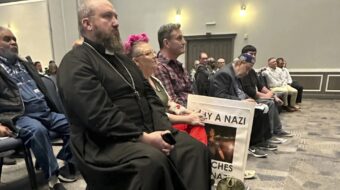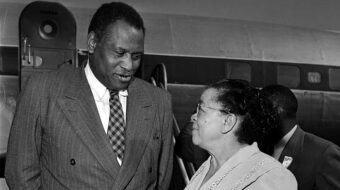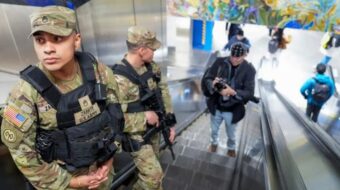As they gear up for March 4 protests against education cutbacks and to keep the university system public, University of California at San Diego students and faculty are adding their demand for a powerful response to recent racist incidents. Their concerns, including urgent efforts to increase racial diversity among faculty and students, are being supported by protesters throughout the UC system.
In mid-February, students including members of some campus fraternities sponsored an off-campus party mocking African American History Month celebrations and inviting participants to dress and act according to racist stereotypes.
Days later, participants in a student-run TV show defended the event, with one student using a racial epithet to describe its critics. On Feb. 25, a student hung a noose from a bookcase in the main library.
UC San Diego, with 24,000 undergraduates, has the lowest percentage of African American students – less than 2 percent – in the UC system. After voters passed an anti-affirmative action ballot measure in 1996, the proportion of Black and Latino undergraduates shrank in the UC system as a whole, with Black students making up 3.8 percent last year and Latinos, 20.4 percent.
UCSD Chancellor Marye Ann Fox has condemned the incidents, and the university has taken actions including investigating the off-campus party, creating a task force to recruit minority faculty and forming a commission on the campus climate. The student who hung the noose has been suspended and police are investigating. Funding has been suspended to all media groups funded by the Associated Students.
Many students, however, were not satisfied with the university’s response. The Black Student Union says the campus climate for racial minorities is in a “state of emergency.” A diverse group of students walked out of a Feb. 24 teach-in on the issue after BSU representatives suggested the event would not “restore the community.”
And on Feb. 26, hundreds of students peacefully occupied the chancellor’s office for six hours.
The racist incidents have been condemned by Governor Arnold Schwarzenegger and members of the state legislature. The NAACP said that if the university failed to punish those involved, the perpetrators could be emboldened and future perpetrators encouraged “to act out their racist tendencies.”
In a Feb. 26 statement, UC President Mark Yudof , chancellors of the 10 campuses and leaders of the Academic Senate said, “Regardless of how such offenses are rationalized, or what free speech rights they purport to express, the acts we have witnessed are unacceptable … We denounce them.”
Speaking March 1 on Democracy Now! UC San Diego professor Daniel Widener, faculty director of the African American Studies minor there, cited many other incidents of racist intimidation on and off campus. He said the 1996 anti-affirmative action initiative and others targeting youth and undocumented immigrants contributed to a climate promoting racism.
Fnann Keflezighi, co-chair of UCSD’s Black Student Union, said past incidents had led UC president Yudof to tell UCSD’s chancellor she needed to address the situation of Black students on campus. “It’s just a very hostile environment for African American students and underrepresented students on an everyday basis in the previous years,” Keflezighi said.
Both linked the anti-racist protests with the broader drive to keep the UC system public. Saying the students “have launched a battle against the resegregation of higher education,” Widener added, “It’s a battle that’s tied to the privatization of higher education, the idea that only those who can afford a top-grade education should receive one.” The campus climate at UCSD “ties into March 4th and what it is fighting for,” said Keflezighi.
More information is at stopracismucsd.wordpress.com.












Comments